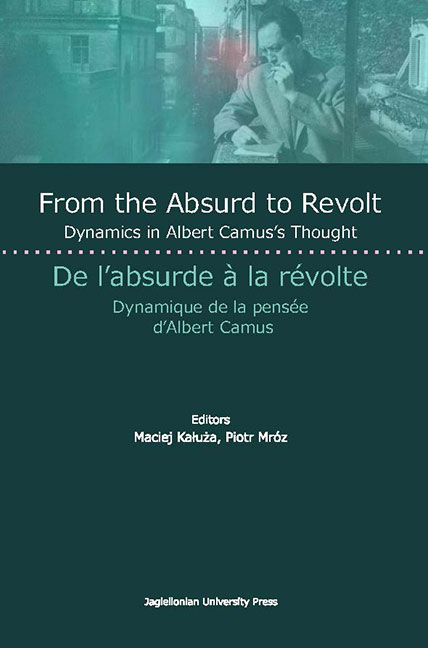Book contents
- Frontmatter
- Contents
- Introduction
- Part One From the Absurd to Revolt, Analysis of Sources for Camusian Concept of Revolt
- Part Two Camus's Revolt in Contemporary Analysis
- Part Three Camus's Revolt in Comparatistic Studies
- “I Hope This Ireland We're Fighting for is Worth It”: Camus’ L'Homme Révolté through Ken Loach's The Wind That Shakes the Barley
- Vers le dialogue: Albert Camus et Leszek Kolakowski
- Le rire de Sisyphe et la danse de Zarathoustra
- Is a Rebel an Outsider? Rebellion in the Interpretation of Colin Wilson
- Il faut sauver les jeunes filles qui se précipitent d'un pont: pour un renouvellement de la lecture de L'Envol de J. Iwaszkiewicz (1957)
“I Hope This Ireland We're Fighting for is Worth It”: Camus’ L'Homme Révolté through Ken Loach's The Wind That Shakes the Barley
from Part Three - Camus's Revolt in Comparatistic Studies
Published online by Cambridge University Press: 22 December 2017
- Frontmatter
- Contents
- Introduction
- Part One From the Absurd to Revolt, Analysis of Sources for Camusian Concept of Revolt
- Part Two Camus's Revolt in Contemporary Analysis
- Part Three Camus's Revolt in Comparatistic Studies
- “I Hope This Ireland We're Fighting for is Worth It”: Camus’ L'Homme Révolté through Ken Loach's The Wind That Shakes the Barley
- Vers le dialogue: Albert Camus et Leszek Kolakowski
- Le rire de Sisyphe et la danse de Zarathoustra
- Is a Rebel an Outsider? Rebellion in the Interpretation of Colin Wilson
- Il faut sauver les jeunes filles qui se précipitent d'un pont: pour un renouvellement de la lecture de L'Envol de J. Iwaszkiewicz (1957)
Summary
THREE METHODOLOGICAL PREMISES
The wide(r) boundaries of Philosophy
One of the presupposed methodological principles implied in Camus’ intellectual activity is the conviction that the boundaries of philosophy are wider than the ones set by the Western tradition in its two and a half millennia of history. In this regard, Camus has been quite clear in many passages of his works and notebooks, but among them one in particular is worth quoting here:
On ne saurait trop insister sur l'arbitraire de l'ancienne opposition entre art et philosophie. Si on veut l'entendre dans un sens trop précis, a coup sur elle est fausse. Si l'on veut seulement dire que ces deux disciplines ont chacune leur climat particulier, cela sans doute est vrai, mais dans le vague. […] Au surplus, rien n'est plus vain que ces distinctions selon les méthodes et les objets pour qui se persuade de l'unité de but de l'esprit. Il n'y a pas de frontieres entre les disciplines que l'homme se propose pour comprendre et aimer. Elles s'interpénetrent et la meme angoisse les confond.
Since I personally share this of Camus’ convictions, in this paper I will analyse one of his books, L'Homme Révolté, through a film on the Irish revolution of 1916, The Wind That Shakes the Barley, made in 2006 by a well-known Irish film-maker Ken Loach, and awarded with the Palme d'Or at the 2006 Cannes Film Festival.
A novel rather than a documentary
The intent of this paper is not to discuss the political legitimacy of the Irish revolution or the historical accuracy of the film. In regard to this last point, Loach's perspective may not be fully impartial, given his nationality and his leftist political view, as Simon Lea has pointed out during my conference presentation in Cracow. Anyway, for the purpose of this paper, I am going to put this aspect in brackets as a precaution, focusing my attention on the narrated story (treating the film as a novel) rather than on the historical facts (as if the film was a documentary instead).
- Type
- Chapter
- Information
- From the Absurd to Revolt/De l'absurde a la Revolte , pp. 197 - 210Publisher: Jagiellonian University PressPrint publication year: 2017

